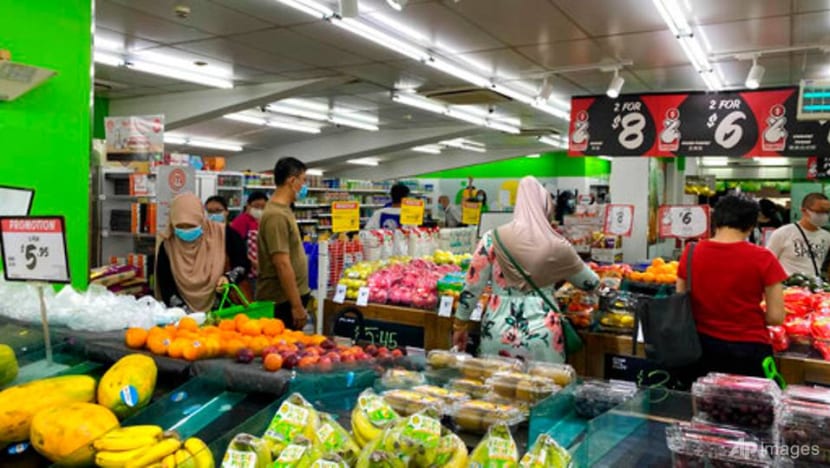Commentary: Inflation expectations can be a self-fulfilling prophecy
Consumers can drive up demand if they think things are going to get more expensive in the coming months. Inflation researchers Aurobindo Ghosh, Khyati Chauhan and Muskan Bagrodia weigh in on why inflation expectations matter as much as economic data.

SINGAPORE: When it comes to inflation, how we expect prices to rise matters. Inflation expectations influence how households and businesses invest and consume, which in turn can affect actual inflation and policymakers’ decisions.
Central banks have been making moves to fight biting inflation. The US recently raised interest rates twice by an aggressive 75 basis points and has signalled more hikes will follow.
In July, the Monetary Authority of Singapore (MAS) tightened monetary policy – for the fourth time since October 2021 – to allow the Singapore dollar to appreciate.
Whether monetary policy is based on interest rate (in the case of US Federal Reserve) or exchange rate (in the case of MAS), policymakers design and communicate economic policies to maintain price stability. They help anchor inflation expectations for household investment and consumption decisions.
Imagine you’re planning to buy a refrigerator. If you believe it will get more expensive in the coming months, you might think it sensible to buy it soon.
If more people behave similarly, it is likely to drive up demand. And as production or supply remains unchanged in the short term, this pushes the prices further up.
These make inflation expectations often a self-fulfilling prophecy, particularly when there are unhinged inflation expectations and consumers panic expecting a future run on items like toilet paper or milk powder, or they reduce consumption demand expecting future gloom like an impending recession.
IMPORTANCE OF TRACKING INFLATION EXPECTATIONS DATA
Central banks use inflation expectations data as part of a dashboard to track and compare it to internal estimates, and to help align with their forward guidance of inflation. US Federal Reserve chairman Jerome Powell had said that inflation expectations was one of the factors in the decision for the 75bp hike in June.
One method of measurement is to survey experts or consumers about their inflation expectations. In Singapore, we have the MAS Survey of Professional Forecasters (MAS SPF) and the DBS-Sim Kee Boon Institute’s Singapore Index of Inflation Expectations (DBS-SKBI SInDEx) survey, a consumer survey started in 2012 which generates the one-year-ahead and five-year-ahead headline and core CPIEx indices.

Of course, measures can differ when surveying industry experts or consumers. Private sector economists might have better access to, and a deeper understanding of official statistics and policies.
Consumers might respond from experience in making purchases and perceptions of current events like impending crises and potential recession. Consumers also place more emphasis on items bought regularly or more frequently (such as food and public transportation) than on bigger ticket items (such as private transportation and accommodation).
WHAT DOES THE DATA IN SINGAPORE SAY?
Individual perceptions seem to predict inflation, particularly the turning points of trends, better than the median forecasts by experts during high inflationary periods.
For example, in March 2021, before the Ukraine-Russia conflict, the MAS SPF placed one-year-ahead inflation at 1.1 per cent while that of the DBS-SKBI was at 2.7 per cent. The actual inflation of March 2022 was 4.5 per cent.
There are two key takeaways from the quarterly DBS-SKBI SInDEx Inflation Expectations survey released in July. First, we find some divergence in perceptions of inflation expectations among different groups of consumers. Consumers could have changed their consumption - by choice or by compulsion due to the impact of the pandemic- and conflict-induced supply side challenges.
Individuals have shifted some costs from transportation to food and utility since the pandemic as more work from home. Inflation expectations of some components like food, housing and utility and transportation have gone up.
Second, the reference consumption basket for measuring the consumer price index (CPI) is due for an update. In Singapore, inflation is measured by the year-on-year change in CPI of the consumption basket from the Household Expenditure Survey conducted every five years. Current inflation is measured against the basket of goods in 2017/18.
Even without global shake-ups like the pandemic and Ukraine war, consumers would change their purchases based on prices, tastes and potentially aspirations for a better standard of living.
And not every household faces the same cost structure. Recent data shows the bottom 20 per cent income group spends about 58 per cent of their monthly budget on essentials like food, accommodation and utilities, compared to the middle 60 per cent which spends about 48 per cent on the essentials.
Higher inflation in these essential components will disproportionately hit the poorer section of the population. Hence, some assistance like Community Development Council (CDC) or Goods and Services Tax (GST) vouchers are needed to alleviate the impact of transitory price rises.
CAN INFLATION EXPECTATIONS BRING INFLATION DOWN?
But if expecting prices to rise can contribute to actual inflation going up, is the opposite true? It’s not so straightforward as just expecting prices to come down.
Effective communication of their future stance on inflation control measures is an essential tool in the repertoire for most central banks, in addition to credible policy decisions. Together, this will ease transitory factors, like increased freight cost and potential of price gouging, and let market supply and demand factors determine prices – not unhinged perceptions of future inflation.
Thus, anchoring inflation expectations means consumers can feel assured and refrain from basing purchasing decisions on fear or speculation.
Aurobindo Ghosh is Assistant Professor of Finance Education and Founding Principal Investigator, Singapore Index of Inflation Expectations (SInDEx) Project, Lee Kong Chian School of Business, Singapore Management University (SMU).
Khyati Chauhan is Economic Research Assistant, International Monetary Fund - Singapore Training Institute, and former research assistant for the SInDEx Project, SMU.
Muskan Bagrodia is a Masters candidate for Financial Economics and research assistant for the SInDEx Project, SMU.
These views are those of the co-authors. They do not represent the views and should not be attributed to their employers, including IMF and its Executive Board and management. These opinions are academic of nature and cannot be construed as financial advice.























